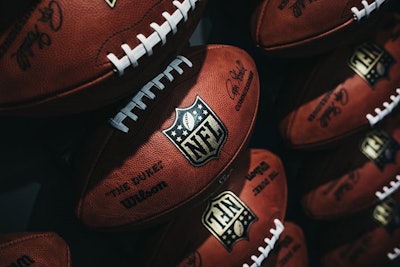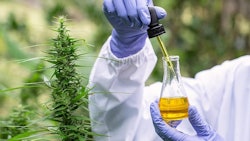
The NFL and its players association (NFLPA) will provide $1 million to fund up to five research studies to investigate pain management and the effects of cannabinoids on athletic performance in elite football players.
The league announced the funding opportunity to explore alternatives to opioids on Tuesday as part of its collaborative effort with the NFLPA through their joint Pain Management Committee (PMC) that was established in 2019 to provide players and league medical staffs information on pain management.
According to the league’s announcement, the funding opportunity is intended to facilitate, at minimum, the following three lines of potential inquiry:
- The effects of cannabinoids on pain in elite football players (post-surgical and/or in daily pain management);
- The effects of non-pharmacologic treatments on pain in elite football players (postsurgical and/or in daily pain management); and
- The effects of cannabis or cannabinoids on athletic performance (e.g., psychomotor, reaction time, cardiorespiratory function) in elite football players.
NFL Chief Medical Officer Dr. Allen Sills told The Associated Press there are a lot of great ideas and important research that need to be funded.
“This is really not an NFL issue or a sports issue,” Sills said. “This is a societal issue, which is how can we better understand and treat pain and what are the alternatives that may be out there for treatment in addition to opioids which have long been used.”
In 2020, PMC conducted two informational forums on cannabidiol (CBD) to learn about the state of the cannabinoid’s science and manufacturing in North American. And earlier this year, the PMC issued a request of information to identify researchers studying pain management alternatives.
According to a study by Washington University School of Medicine in St. Louis substance abuse researcher Linda Cottler, whose team surveyed 644 players who retired from the NFL between 1979 and 2006, 52% of retired players said they had used opioids in order to stay on the field longer and compete through pain or injury. Of those, 71%, or roughly 240 players, met the criteria for misuse.
And it turns out that those who used and misused opioids during their NFL careers were also more likely to continue using the drugs in retirement, Cottler said in a 2011 interview with BioMed Radio.
Some retired NFL players, including Nate Jackson, who played tight end for the Denver Broncos from 2003 to 2008, have spoken out about their use of cannabis during their active careers as a means to playing through pain and/or injuries.
In a 2016 interview with Sports Illustrated, Jackson said he self-medicated with cannabis.
“Pain serves a purpose; pain is there for a reason,” Jackson told SI. “And for football players in particular, they have to know their pain and know their body better than the average person if they’re going to perform at an optimum level. And for me, pain pills dulled my pain, I felt numb, I felt lethargic, I felt slow. And the same kind of strength that I had under my sober mind left me when I was under those pills. I felt worthless. Marijuana didn’t do that. It re-framed my pain. I could still feel it but in a much more bearable context.”
The NFL’s intent through the $1 million funding opportunity is to demonstrate the potential for translational breakthroughs by leveraging innovative research and emerging science related to the use of alternatives to opiates in pain management, according to the league’s announcement.
The NFL opened the application process (which aims to fund up to five research studies) on June 8, with a focus on initial proposals that seek to address the potential of cannabinoids to help players in the above-mentioned three lines of inquiry.
Proposals must be submitted by 6 p.m. July 31. The PMC will pare down submissions for formal presentations to be held in November. The funding will be awarded the week of Dec. 6.

























